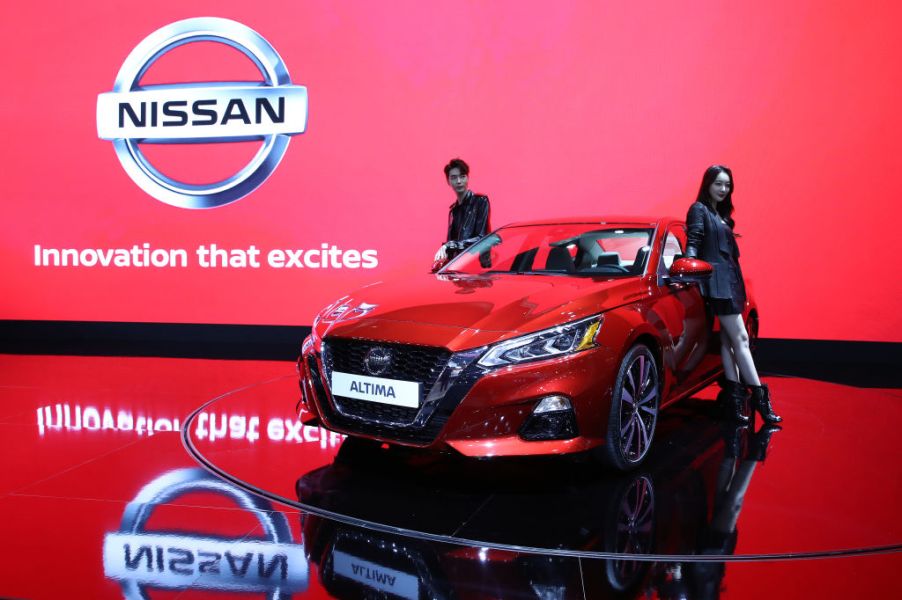
The Nissan Altima Isn’t Selling Like It Used To
The Nissan Altima is the automaker’s entry in the midsize sedan segment. It’s larger, more powerful, and more upscale than the compact Sentra, yet it’s smaller and less luxurious than the full-size Maxima.
The popularity of the Altima rose through the early 2000s, and sales peaked in the 2010s. In the past few years, sales declined significantly. Why aren’t people buying the Nissan Altima the way they used to? Will the 2020 model year’s new features bring buyers back?
Sliding sales
The Nissan Altima has been available in the U.S. since 1993, but the sedan’s sales never reached 200,000 in the ’90s. Instead, they averaged around 150,000 units, according to CarSalesBase.com.
Shortly after the start of the new millennium, U.S. sales of the Nissan Altima hovered around 200,000. Buyers responded positively to the third-generation version, which debuted in 2002. That year, Nissan upgraded it from a compact to a midsize car by increasing its size and boosting horsepower.
Altima sales continued to grow yearly, and by 2012, they topped 300,000. Sales stayed above the 300,000 mark until 2017 when they slid back to slightly over 250,000. For the calendar years, 2018 and 2019 sales plummeted down close to 210,000.
Why did Nissan experience such a drastic drop in the sales of the Altima in the past few years? For one thing, the Altima has some strong rivals in a diverse segment. Its competitors include crowd-pleasers such as the Honda Accord and the Toyota Camry. And while other midsize sedans like the Hyundai Sonata, Kia Optima, and the Subaru Legacy don’t have the kind of impressive sales numbers that the Accord and the Camry do, they still offer buyers other alternatives.
Another key reason for the Altima’s ailing sales is the recent skyrocketing popularity of SUVs, crossovers, and pickup trucks among buyers. As a result, passenger car sales generally have taken a huge hit. An SUV’s flexible passenger seating and cargo area and a truck’s engine power and hauling capacity appeal to today’s buyers.
So, considering what the Altima is up against in the face of declining sales, what has Nissan done to make this year’s model more attractive?
A preview of the 2020 Nissan Altima
Although the Toyota Camry and the Honda Accord are more popular than the Nissan Altima, the sixth-generation Nissan sedan has two special options that the other two don’t: all-wheel drive and a 248-hp VC-Turbo engine. The latter is the first production variable compression turbo in-line four-cylinder, and it replaces the Altima’s 3.5-liter V6 from the previous generation. The VC-Turbo engine is supposed to provide power comparable to a V6 but also as well as the fuel economy of a four-cylinder engine.
Because the Altima was entirely refreshed for the 2019 model when the sixth generation was introduced, Nissan has made only a few updates to the 2020 version.
Most importantly, the automaker has made its full suite of driver-assistance features standard on the second-lowest trim, the SR. The suite, called Nissan Safety Shield 360, consists of automatic emergency braking with pedestrian detection, high beam assist, and blind-spot warning. It also includes lane departure warning, rear automatic braking, and rear cross-traffic alert.
The driver-assist suite is optional on the lowest trim level, the S. Previously, both the S and SR had only standard forward-collision warning and automatic emergency braking.
Other updates include standard glossy-black interior trim on the SV, SL, and Platinum trim levels and a memory function for driver-side mirror positions on the Platinum variant.
Five trim levels are available on the 2020 Nissan Altima: the S, SR, SV, SL, and Platinum. The starting price for the base model S is $24,995. Buyers can get a bit more on the SR, which starts at $26,595. Prices on the SV and SL start at $28,775 and $31,135. The Platinum trim level begins at $33,075.
Will Nissan sell more new Altima models this year?
It seems unlikely that Nissan will see enough of an uptick to return Altima sales to 300,000 this year. The challenges of competing in a segment with solid rivals as well as contending with the popularity of SUVs and trucks are tough enough for the sedan. But world events might stymie its sales even more.
Like most car manufacturers, Nissan is struggling with the effects of the worldwide COVID-19 crisis. In March this year, it paused production at its Smyrna, Tennessee plant for two weeks to aid in containing the virus. This plant produces not only the Nissan Altima but also the Maxima, Rogue, Leaf, Pathfinder, and the Infiniti QX60. Production has also been halted at the Sentra plant in Mexico. At the same time, Nissan’s Sunderland plant in the U.K. has also been temporarily shuttered.
Another strike against the Altima—and other vehicles—is that buyers are staying home, for the most part. Unless they urgently need a vehicle, they may not be thinking much at all about car shopping during this difficult time. In many states, however, dealerships are doing business online and under social distancing guidelines.
Sales for the 2020 Nissan Altima may not be promising this year, but the newly available safety features in lower trims and the $1,350 all-wheel-drive option will certainly attract some buyers when life and work in the U.S. return to something like normal.


